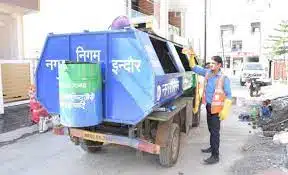The city of Indore already has a tag of “clean city” added to its name. In a much sought-after attempt, it has also been able to accomplish and garner the tag of the first seven-star garbage-free city which is an accomplishment on behalf of the second iteration of the Swachh Bharat Mission.
Waste management is certainly a significant aspect of governance and management. With a country of more than a million population, the quantity of waste generated too has skyrocketing figures with each passing day. Besides recent incidents in the Brahmapuram district in Kochi or related incidents concerning climate change in other parts of the nation have taken an averse toll on the environment. Consequently, waste management and generation has become a significant tool to draw attention upon.
The city of Indore already has a tag of “clean city” added to its name. In a much sought-after attempt, it has also been able to accomplish and garner the tag of the first seven-star garbage-free city which is an accomplishment on behalf of the second iteration of the Swachh Bharat Mission. Such efficient management calls for honing skills in practicing the same. Besides, the entire thing is not just concentrated on waste management but also on earning from the waste generated.
A look into similar statistics will provide a view of the same:
In 2018-19, Indore earned about Rs. 4 crores from garbage processing.
In 2019-20, earnings from waste processing increased to nearly Rs. 6 crores.
Indore expects to grow its earnings to nearly Rs. 10 crores in 2021-22.
Efficient Waste Segregation System in Indore: Managing 1115 Metric Tonnes of Daily Waste
According to Insight reports, with a population of around 35 lakhs, the city of Indore produces around 1115 metric tonnes of waste every day. It is followed by a well-laid-out waste segregation system. As per Swachch India NDTV reports, there exists a six-bin waste segregation system that collects waste from households comprising 850 vehicles. Waste is segregated into wet, electronics, plastic, non-plastic, biomedical, and hazardous. The benefits of this system cannot surely be undermined. This categorization ensures the best possible organizational efforts into play. Eventually, managing becomes a less perplexing deal.

As per 2022 Insights data, around 8,500 safari mitras are employed to keep the city of Indore clean. This is a positive indication that employment opportunities are also generated in the process of keeping the city safe, clean, and hygienic. Further, each of the vehicles has separate rooms or compartments for waste disposal and treatment.
Use of bio-CNG
Keeping up to its tag of the cleanest city for the 6th time in a row, bio CNG ensures less pollution. Working on wet waste also ensures less toxic emissions thus making the process of waste management a smooth one.

Big earnings paving the way towards reaping economic benefits
As per The Hindu reports, the cleanest city Indore earns around Rs. 4 crores annually through a proper waste management system. The sale of carbon credits in the international market is also attributed to a sufficient generation of revenue. This in turn ensured the count of greenhouse emissions since the sale of carbon credits acts as a financial incentive to keep a check on carbon footprints.
In this entire process, to note the balance struck by the efficient system of waste management is quite interesting to note. Not only does it ensures keeping the city clean but also employs people, generates revenue, and considerably makes a difference in positively impacting the environment. This model ought to be embraced by other cities too with a far sighted view to addressing issues concerning climate crisis besides reaping economic benefits from the nation.













